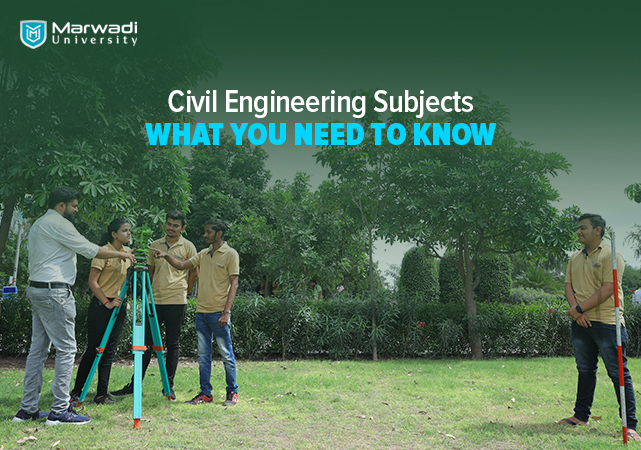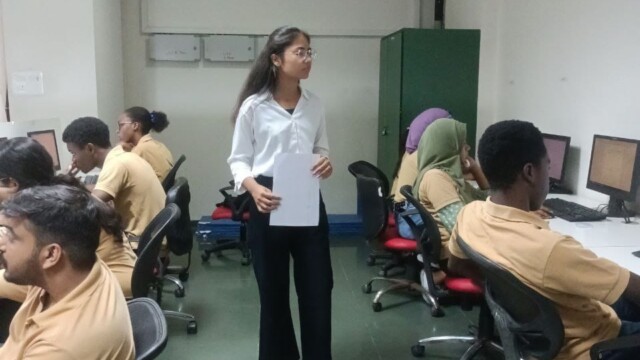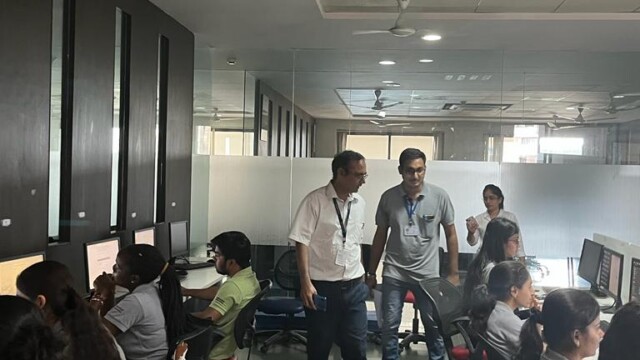Civil engineering is one of the most sought-after careers in the engineering field for numerous reasons. As a student, it can be beneficial to learn more about a particular course before pursuing it. Especially about the syllabus and the multiple subjects that you will study throughout the duration of the course.
Marwadi University is one of the best civil engineering colleges in India. It offers a great learning experience to the students with the help of a well-curated syllabus and expert faculties.
This blog discusses some of the most important civil engineering subjects that every student must know before pursuing civil engineering!
Subjects to Study in civil engineering course in India
Civil engineering colleges in India encompass a diverse range of subjects that are discussed further
Engineering Physics
Engineering physics is one of the most common subjects included by every civil engineering college in India. It integrates physics principles into civil engineering applications. The topics like material properties, structural mechanics, and environmental impacts are discussed.
This subject enhances students’ understanding of how physical laws influence construction and infrastructure design. Fostering innovative and sustainable solutions in the field.
Engineering Chemistry
Engineering chemistry in civil engineering focuses on the fundamental principles of chemistry. These are applied to construction materials, environmental impact assessment, and corrosion prevention. It examines the interactions between materials and their surroundings.
Thus, aiding civil engineers in designing durable and sustainable infrastructure. While still considering chemical factors.
Engineering Mechanics
Engineering mechanics in civil engineering involves studying the principles of force, motion, and equilibrium. It underpins the design and analysis of structures, ensuring their stability and safety.
Topics include statics, dynamics, Newton’s laws, friction, and moment of inertia. It’s crucial for understanding and creating resilient and functional infrastructure.
Concrete Technology
Concrete Technology in civil engineering covers the study of concrete’s composition, properties, and applications. It explores mixed design, durability, construction techniques, and quality control. Understanding aggregates, admixtures, curing methods, and testing is crucial. Innovations like self-healing concrete and sustainable practices are also integral to modern concrete technology.
Surveying
Surveying in civil engineering involves measuring, mapping, and analyzing land and its features. It includes techniques for determining distances, angles, elevations, and positions of points on the Earth’s surface. This data is crucial for designing and constructing infrastructure projects. Such as buildings, roads, and bridges, ensuring accuracy and proper alignment.
Highway Engineering
Highway Engineering in civil engineering focuses on designing, constructing, and maintaining roadways and transportation systems. It covers aspects like geometric design, pavement materials, traffic analysis, safety measures, and sustainability.
Engineers optimize road layouts, materials, and traffic flow to ensure efficient and safe movement of vehicles, enhancing transportation networks.
Irrigation Engineering
Irrigation Engineering in civil engineering focuses on water management for agricultural, landscape, and environmental needs. It covers designing, planning, and managing systems to efficiently distribute water, involving hydraulics, soil-water interactions, and technology integration.
The subject aims to enhance crop productivity and sustainable resource utilization through effective water delivery and conservation strategies.
Environmental Engineering
Environmental Engineering in Civil Engineering focuses on managing, preserving, and improving the environment. It addresses air and water quality, waste management, pollution control, and sustainable development. Engineers design systems to minimize environmental impact, ensuring a cleaner, healthier future for communities and ecosystems.
Structural Engineering
Structural Engineering in Civil Engineering focuses on designing and analyzing structures like buildings, bridges, and towers. It ensures the safety, stability, and functionality of structures under various loads and conditions. Engineers employ principles of physics and materials science to create resilient and efficient structures that withstand the test of time.
Geotechnical Engineering
Another major subject included by civil engineering colleges in India is Geotechnical Engineering. The subject focuses on soil and rock behaviour to design foundations, slopes, and tunnels.
It deals with soil mechanics, site investigation, and geotechnical analysis. Engineers assess stability and design structures for safety. It’s crucial for infrastructure projects, ensuring solid foundations and preventing failures.
Construction Management
Construction Management in civil engineering involves planning, executing, and controlling projects. It focuses on scheduling, resource allocation, and budget management. Effective communication, risk assessment, and problem-solving skills are essential.
Collaboration with engineers, contractors, and stakeholders ensures successful project completion. It combines technical expertise with leadership abilities for efficient construction processes.
Ethics in Engineering
The civil engineering course in India also includes the subject of Ethics in Civil Engineering. As it explores moral considerations within the field. It addresses responsibility in design, construction, and environmental impact.
Engineers must prioritize safety, adhere to codes, and consider long-term consequences. Balancing public welfare and business interests is paramount. Ultimately, ethical decisions shape the industry’s integrity and societal impact.
Study Civil Engineering Course in India at Marwadi University
These are some of the most vital subjects in the civil engineering course be it BTech in civil engineering or diploma in it. If you are planning to advance your career in this field, then learning more about these subjects will be helpful.
Along with getting to know about the subjects, students should also select the best civil engineering colleges in India.
Selecting such an educational institute ensures overall development while studying the course. Marwadi University is one of the best civil engineering colleges in Gujarat!
















 International Airport
International Airport  Railway Station
Railway Station  GSRTC Bus Port
GSRTC Bus Port 


